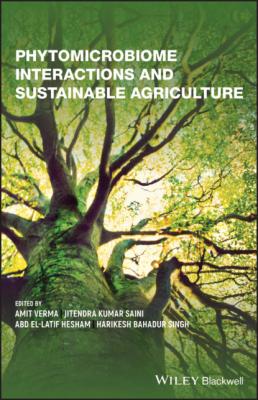Phytomicrobiome Interactions and Sustainable Agriculture. Группа авторов
Читать онлайн.| Название | Phytomicrobiome Interactions and Sustainable Agriculture |
|---|---|
| Автор произведения | Группа авторов |
| Жанр | Биология |
| Серия | |
| Издательство | Биология |
| Год выпуска | 0 |
| isbn | 9781119644828 |
15 8 Phytomicrobiome 8.1 Introduction 8.2 Phytoremediation 8.3 Phytomicrobe Interactions and Rhizomediation 8.4 Conclusion and Future Prospects References
16 9 Rhizospheric Biology 9.1 Introduction 9.2 Engineering the Rhizosphere 9.3 Engineering Soil Microbial Populations and Plant–Microbe Interactions 9.4 Plant Growth‐Promoting Rhizobacteria: Mechanisms, Potential, and Usages 9.5 Plant–Microbe Interaction 9.6 Biofertilizers and its Applications 9.7 Plant Genetic Engineering 9.8 Conclusion and Future Prospects Acknowledgments References
17 10 Application of Inorganic Amendments to Improve Soil Fertility 10.1 Introduction 10.2 Impact of Bhoochetna Movement in Southern India 10.3 Sustainable Agriculture 10.4 Factors to Be Considered While Selecting a Soil Amendment 10.5 Advantages of Soil Amendments 10.6 Land Modeling 10.7 Major Applications of Soil Amendments 10.8 Combination Strategy for Soil Quality Improvement 10.9 Conclusion and Future Prospects References
18 11 Improved Plant Resistance by Phytomicrobiome Community Towards Biotic and Abiotic Stresses 11.1 Introduction 11.2 Microbes and Plants 11.3 Response of Abiotic Response on Plant 11.4 Role of Phytohormones in Increasing Abiotic and Biotic Stress Tolerance 11.5 Gene Transfer in Plants 11.6 Conclusion and Future Prospects References
19 12 Bioprospecting 12.1 Introduction 12.2 Plant‐Associated Microbial Communities 12.3 Beneficial Effects of Plant‐Associated Microbial Communities 12.4 Role of Microbial Processing (Signals) in Facilitating Plant Growth 12.5 Conclusion and Future Prospects Acknowledgments References
20 13 Advances in Omics and Bioinformatics Tools for Phyllosphere Studies 13.1 Introduction 13.2 Recent Trends and Approaches 13.3 Computing for Biology 13.4 Bioinformatics in Microbial Research 13.5 Phyllosphere Microbiome Studies Based on Genome‐Wide Association 13.6 Omics Strategies and Their Integration 13.7 Conclusion and Future Prospects References
21 14 Microbial Mediated Zinc Solubilization in Legumes for Sustainable Agriculture 14.1 Introduction 14.2 Chronological Events of Zinc Biology 14.3 Role of Zinc in Living System 14.4 Zinc Deficiency vs. Zinc Toxicity in Crop Plants 14.5 Availability of Zinc in Soil Environment 14.6 Factors Affecting Zinc Availability to Plants 14.7 Response of Legume Crops to Zinc 14.8 Microbial Mediated Zinc Solubilization in Legume Crops 14.9 Conclusion and Future Prospects References
22 15 Composition and Interconnections in Phyllomicrobiome 15.1 Introduction 15.2 Significance of Phyllospheremicrobiota 15.3 Phyllosphere Microorganisms as Plant Growth Regulator
